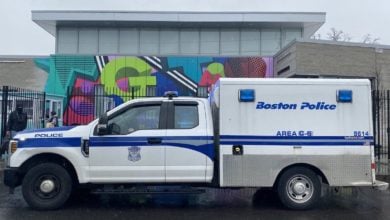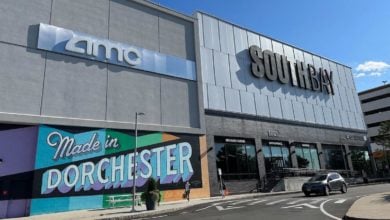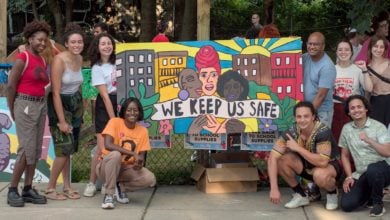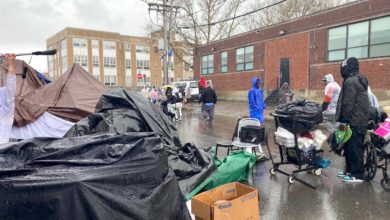As of April 10, Massachusetts has reported the 4th most confirmed cases of COVID-19 of any state in the U.S. As the virus spreads, local organizers are raising concerns about the well-being of the incarcerated population. In a March 31 press conference, Governor Charlie Baker rebuffed calls to decrease Massachusetts’ incarcerated population as other cities, states and countries have done, stating that “we believe the correct position is for us to continue to do the things we’re doing to keep people inside the system safe.”
Recent developments inside Rikers Island, the infamous New York City jail, poke holes in Baker’s assertion that prisons and jails can be “safe” places during a pandemic. Over 700 people in Rikers Island have tested positive for COVID-19. In Massachusetts, three incarcerated individuals have already died from the virus. In the overcrowded, unsanitary conditions of prisons, a virus can spread like wildfire.
Liberation News interviewed Leslie Credle, a Boston-based anti-prison organizer with Families for Justice as Healing and the National Council of Incarcerated and Formerly Incarcerated Women and Girls, about how Massachusetts’ COVID-19 response is impacting incarcerated people. This interview has been edited for clarity and length.
Liberation News: How have Boston and Massachusetts’ responses to COVID-19 been impacting people who are currently incarcerated?
Leslie Credle: Massachusetts has been very slow in dealing with COVID-19. Other states are moving more quickly, releasing more people. I think [Los Angeles] released like 1700 people in the first week and Massachusetts [Supreme Judicial Court] put out a ruling that you have to write a motion, and you have to show that your client is sick or elderly. But the courts are shut down and they’re not really taking cases like that quickly, so it’s a very slow moving process.
I talk to people on the inside all the time. I know there were like four lifers in [Massachusetts Correctional Institution – Framingham] that got affected, were taken to the hospital and since then nobody has heard from them… We’re asking for Governor Baker to grant them clemency because they are elderly and they are sick and they are a high risk category, but we still have not heard back from the Governor’s office. And as everyone knows, Governor Baker’s never granted clemency to anybody in Massachusetts for his whole term period.
[MCI-Framingham] is on lock-down. They’re not having access to showers, they have minimal cleaning supplies… They’re not having access to their phones… People who have been granted parole, we even contacted the parole board and basically they stopped all moves on paroles. There’s a couple people we know who are waiting to get out and they could be released right now because they’ve been granted parole, but the prison is in lock-down indefinitely so nobody’s leaving. The [Department of Correction], we asked for people to be released who have less than six months on their sentence and grant medical parole, but they have been non-responsive… We’ve contacted the Attorney General. Nothing’s been done to protect the incarcerated community.
As you know, [three] people have died in Bridgewater. We know that there’s a major outbreak in that facility, and we have been told that people are being put in quarantine and then left in a solitary cell with no medical care — they’re just put in there, they haven’t been showered in four, five days. If they have COVID, they’re left to fend for themselves. We’ve seen videos from people who are incarcerated… there’ll be eight people in one cell, and three people are infected in their beds, and they’re sleeping right on top of each other in a bunk or in close proximity. And the videos have shown them coughing and the nurse came around and told them, “oh half of you guys aren’t gonna make it out of here and there’s nothing we can do.” They had a makeshift tent in the basketball court, which the prisoner said they were putting people’s bodies in there. The incarcerated population is definitely a death trap. None of these people have death sentences and this is Massachusetts’ response, they just don’t care.
LN: What is it about prisons that makes them such a dangerous place for public health generally, and during pandemics specifically?
LC: Most prisons are overpopulated and what makes them dangerous is that the administration, they’re not gonna tell the public… The administration is gonna hide it and they’re not gonna treat. They don’t have the medical staff. When you’re in prison, on a normal day there’s no doctors. You have nurses and they are not trained in emergency care… They don’t have the staff right now to transport people to the hospitals, because a lot of the [correction officers] are calling in sick, so they’re understaffed. So if somebody needs to be put on a ventilator there — they don’t have ventilators there in prison… They don’t have a quarantine, prisons weren’t built for quarantine, they don’t expect this.
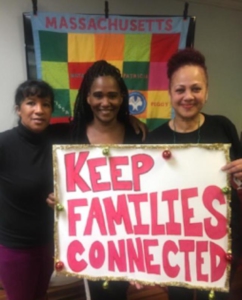
I can imagine they might be emptying out one unit but when somebody gets infected in prison it’s gonna spread rapidly, it’s not like they can isolate, they can’t quarantine in their cell. They’re housed together, there’s three people in a cell, there’s eight people to a cell sometimes… The whole prison can be infected very quickly and once that happens it’s a death trap, it’s a death sentence and they’re not gonna tell anybody. And that’s the big thing about it: they’re gonna keep it a secret and they’re gonna scrape it under the rug.
LN: So what should the government be doing to keep incarcerated people safe during this time?
LC: Seventy percent of the [women’s] jail population [in Massachusetts] is pretrial… meaning they’re waiting trial, so they haven’t even been found guilty. We should be letting out everyone that’s pretrial. We should be letting them fight their case from home. It is a known fact that 98 percent of the people who are released on bail come back to court. It’s a myth that if they release them they’re not gonna come back to court, that’s not true. So that can empty out 70 percent of the jail population in Massachusetts.
Governor Baker could be granting clemency to [older and sick women]. We advocate for women, so I’m gonna say for women… A lot of the long-term lifer women [in MCI-Framingham] are sick from cancer and have breathing problems from living in those cottages for 20-30 years they’ve been in there… He could grant clemency to those women, most of them have already spent 20-30 years of their sentence already, they’ve done enough time.
We’ve also passed the primary caretakers bill which is a law right now that could be utilized. It is saying that if you are [convicted of a nonviolent offense] and you are the primary caretaker, you are a single mom — and we all know by the studies we’ve done, 80 percent of the women who are incarcerated are the primary caretaker of a child… the bill says that you can get an alternative sentence if you’re the permanent caretaker of a child. So you can get home-confinement, you can get a drug program, you can get probation, you can get parole. So we can use that law right now to start releasing women and get that jail population down.
LN: Why do you think Governor Baker, the state level and the sheriffs county level aren’t being more proactive in their response?
LC: Governor Baker wants to increase the DOC budget by $41 million this year even though the Department of Corrections population has continued to decrease every year. The sheriffs are asking for more money too. It’s about money. They get $90,000 a year to incarcerate a person… We want Governor Baker to allocate some of that money. They’re planning to build a $50 million prison in Norfolk County to replace MCI-Framingham right now and we’re saying that with $50 million dollars, if you invest that back into our community we can decarcerate women in Massachusetts…
Everybody knows that women are usually incarcerated because of substance abuse, poverty issues, mental health and homelessness. We criminalize all of these things, we criminalize mental health, we criminalize homelessness and we criminalize poverty. Instead of locking people up because they’re homeless and they’re loitering or they’re stealing because they have an addiction problem, we can put some [money] into a re-entry program or a prevention program.
LN: What are you all doing to organize?
LC: Our legal counsel works with state attorneys in other cities. We partner with other organizations and filed a bulk lawsuit to release a population who is vulnerable. Which are elderly, people with existing medical conditions, people who are on pretrial… we have been successful in Rikers… during this pandemic we’re focusing on getting as many people released throughout the country and jails and prisons around the country, that’s what we’re fighting for right now…
We have a major social media campaign… on Monday, we have our community members and our supporters, everybody logs on social media or calls the Massachusetts parole board and we give them a script to read; “we need to release people who are eligible for parole, waiting to get out.” We’ll give ‘em a script like that. Tuesday we’ll call the DA’s offices… On Wednesdays, we call the sheriffs departments… We’ll call every Sheriff’s department, putting pressure on them to release, release, release. On Fridays, we call it “Free Her Fridays.” We make personal social media videos where we’ll ask to release somebody that we know… On our website peoplenotprisons.org, we have a COVID page with all the scripts on it and all the lists.
LN: Is there anything during this time that’s making you optimistic moving forward?
LC: Yes, for me it was my friend Cookie who was in the hospital on a ventilator. She was in Rikers Island being held and she was taken out. The story was there was three women brought in the unit who [the jail] knew had COVID, and they let them in the unit anyway. And the women who were already there were telling the officers that they should separate them from the people who already were in prison who didn’t have it, and they ignored them. And what happened was a lot of women caught it from these three women. My friend Cookie was one of them and she has Bronchial Asthma, and so she was in the hospital infirmary in Rikers for weeks. And they would not take her to the hospital until it was vital. She almost died. They rushed her to the hospital and we advocated, I advocated for her. We called civil rights attorneys in New York. Our organization filed a motion to release 32 people from Rikers and her name was added to that list. Yesterday she was released and I spoke to her today. For me, all everything I worked for… that was the moment that touched me the most really. It was all the work paying off just to see that she’s alive and she’s out and she’s free.
Read more from Liberation News: Arrest the virus, free the prisoners!


